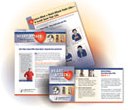What Is Heart Block?
Heart block is a problem that occurs with the heart's electrical system. This system controls the rate and rhythm of heartbeats. ("Rate" refers to the number of times your heart beats per minute. "Rhythm" refers to the pattern of regular or irregular pulses produced as the heart beats.)
With each heartbeat, an electrical signal spreads across the heart from the upper to the lower chambers. As it travels, the signal causes the heart to contract and pump blood.
Heart block occurs if the electrical signal is slowed or disrupted as it moves through the heart.
Overview
Heart block is a type of arrhythmia (ah-RITH-me-ah). An arrhythmia is any problem with the rate or rhythm of the heartbeat.
Some people are born with heart block, while others develop it during their lifetimes. If you're born with the condition, it's called congenital (kon-JEN-ih-tal) heart block. If the condition develops after birth, it's called acquired heart block.
Doctors might detect congenital heart block before or after a baby is born. Certain diseases that may occur during pregnancy can cause heart block in a baby. Some congenital heart defects also can cause heart block. Congenital heart defects are problems with the heart's structure that are present at birth. Often, doctors don't know what causes these defects.
Acquired heart block is more common than congenital heart block. Damage to the heart muscle or its electrical system causes acquired heart block. Diseases, surgery, or medicines can cause this damage.
The three types of heart block are first degree, second degree, and third degree. First degree is the least severe, and third degree is the most severe. This is true for both congenital and acquired heart block.
Doctors use a test called an EKG (electrocardiogram) to help diagnose heart block. This test detects and records the heart's electrical activity. It maps the data on a graph for the doctor to review.
Outlook
The symptoms and severity of heart block depend on which type you have. First-degree heart block may not cause any severe symptoms.
Second-degree heart block may result in the heart skipping a beat or beats. This type of heart block also can make you feel dizzy or faint.
Third-degree heart block limits the heart's ability to pump blood to the rest of the body. This type of heart block may cause fatigue (tiredness), dizziness, and fainting. Third-degree heart block requires prompt treatment because it can be fatal.
A medical device called a pacemaker is used to treat third-degree heart block and some cases of second-degree heart block. This device uses electrical pulses to prompt the heart to beat at a normal rate. Pacemakers typically are not used to treat first-degree heart block.
All types of heart block may increase your risk for other arrhythmias, such as atrial fibrillation (A-tre-al fih-brih-LA-shun). Talk with your doctor to learn more about the signs and symptoms of arrhythmias.
Have questions about heart disease in women? Join The Heart Truth®, Million Hearts™, the American College of Cardiology, and Healthfinder.gov for a World Heart Day Twitter chat on September 28, at 1 p.m. eastern time. Learn more about the history of women’s heart disease research and ask live experts your questions. Go to www.twitter.com, and search for #HeartChat to join the chat.
Clinical trials are research studies that explore whether a medical strategy, treatment, or device is safe and effective for humans. To find clinical trials that are currently underway for Heart Block, visit www.clinicaltrials.gov.

When a heart attack happens, any delays in treatment can be deadly.
Knowing the warning symptoms of a heart attack and how to take action can save your life or someone else’s.
The NHLBI has created a new series of informative, easy-to-read heart attack materials to help the public better understand the facts about heart attacks and how to act fast to save a life.
Click the links to download or order the NHLBI's new heart attack materials:
“Don’t Take a Chance With a Heart Attack: Know the Facts and Act Fast” (also available in Spanish)
“Heart Attack: Know the Symptoms. Take Action.”
“Learn What a Heart Attack Feels Like—It Could Save Your Life”
The NHLBI updates Health Topics articles on a biennial cycle based on a thorough review of research findings and new literature. The articles also are updated as needed if important new research is published. The date on each Health Topics article reflects when the content was originally posted or last revised.















